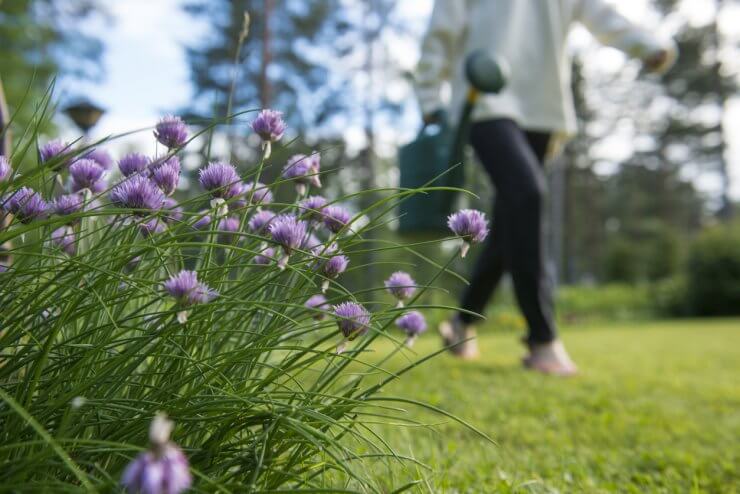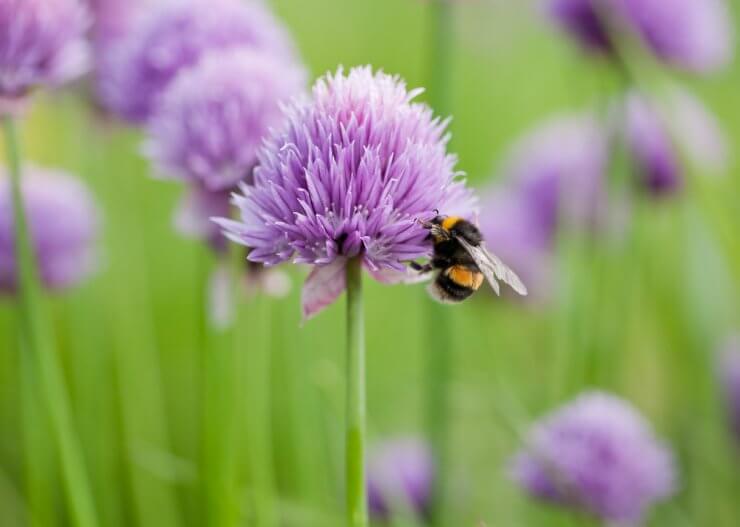I could be wrong, but I feel like chives don’t get the praise they deserve. Growing chives is about as easy as it gets in the garden, and it’s a versatile herb in the kitchen. Plus, they’re gorgeous when they flower.
As easygoing as they are, there are still a few things to think about that can help chives grow. And if you’re not convinced that chives are right for you, I’m adding in some reasons for growing chives that might change your mind.

The Easy Approach to Growing Chives
1. Take care of your soil. Chives are quite hardy, but they’ll do best in rich, well-drained soil with plenty of organic matter.
2. Go easy on the water. Chives do not like soggy soil. I get it. I don’t really like spending the day with wet shoes on, either.
3. But not too easy. Chives don’t like wet feet, but they also don’t like to dry out.
4. Plan ahead if you’re growing chives from seeds. The seeds can take up to two weeks to germinate, then they need 3-4 weeks to establish themselves. Lastly, you’ll need about a week to harden them off before they go permanently outdoors. You can also plant them directly in the ground as long as there is no longer any chance of frost.
5. Make sure they have plenty of sun. Chives are sun lovers. Although they will grow in partial shade, you’ll have much happier herbs if they can spend the day in the sunshine.
6. Don’t be afraid to split them up. Chives will spread out, so feel free to dig some up and move them to another section of the garden or into a container you can bring inside for winter.
7. Keep an eye out for weeds. Chives don’t have very deep roots, so weeds can be a big source of competition for nutrients.
8. You don’t need to fertilize chives. One nice thing about growing chives is that they don’t need a lot of attention. You can fertilize them, but go easy. Only use about half the suggested amount and only use it every 4-6 weeks.
9. Harvest them. It’s okay. Take your garden shears out and cut as many chives as you want, leaving about two inches of the leaf. The plant will continue growing.
10. Stop harvesting them. I know this sounds contradictory to the last tip, but if you’re growing chives outdoors, stop harvesting them in late summer, so the herb has time to get ready for winter.

Alright, so there are ten tips for growing chives. Now the question is, why would you want to grow chives?
1. Chives attract pollinators. Bees and butterflies both love chive blossoms, making chives a great plant to have in your garden.
2. They make great companion plants. Chives can help repel harmful pests such as aphids, cucumber beetles, and Japanese beetles.
3. Cheese & Chive Frittata. I probably don’t need to explain why this is a good reason for growing chives.
4. Chives are good for your heart. Some of the compounds in chives, allicin, and quercetin, to be specific, may help lower cholesterol and blood pressure and reduce plaque buildup in arteries.
5. Chive blossoms are edible and delicious. You can eat the entire herb, but chive blossoms make a lovely garnish on so many dishes, and they have a nice, subdued oniony flavor (or garlicky, depending on the variety).
This is just the tip of the chive iceberg. It’s really a fantastic herb. For instance, did you know chives can keep evil spirits out of your home? (I can’t vouch for that, but it’s a cool folktale.) Or do you know why Ancient Romans fed chives to their racehorses? And my favorite fun fact about chives is that you can use it to make pesto. It’s true. Although there’s a Chive Butter recipe in the Chive Gardening Guide that is Out. Of. This. World! Ready to learn more about chives and start growing them in your garden? Check out the Chive Gardening Guide.


 Previous
Previous

